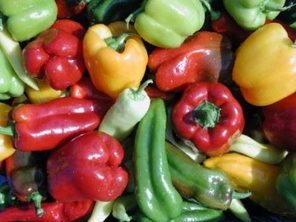Eggplant and tomato diversity. Photo: W.Palme, Horticultural College and Research Institute, Austria.
Grant Scheme Activities
Phase XI
| First Call (2023) |
Working Group activities and related events
June 2025
A webinar on the Global Conservation Strategies for Eggplant and Capsicum was held on 23 June 2025, organized in collaboration with the Crop Trust.
Recording and presentations are available here
October 2024
The kick-off meeting of the EuroPepLand Activity was held jointly with the EVA Pepper network annual meeting from 30-31 October in Almeria, Spain. More info
March 2024
The EuroPepLand Activity, submitted by the Solanaceae Working Group for funding under the First Call of the Phase XI ECPGR Activity Grant Scheme, was selected by the Executive Committee and approved in March 2024.
August 2023
Pasquale Tripodi, Italy, is the new Chair of the Solanaceae Working Group.
June 2020
European Evaluation Networks (EVA) - Vegetables Network. Due to the COVID-19 pandemic, the first annual project meeting of the EVA Pepper Project, originally planned for 9-10 June 2020 in Pontecagnano, Italy, was replaced by a virtual meeting on 9 June 2020. The meeting of the Solanaceae WG, which was to be held back-to-back with the EVA Pepper Project Meeting, was postponed to a later date, because it cannot be replaced by a virtual meeting. Arrangements were made for some members of the Solanaceae WG to attend the EVA Pepper virtual meeting to make a link with the Working Group. [more info]
March 2020
New homepages for the Groundcherry, Pepino and Tree Tomato databases
These three databases are maintained by the Center for the Conservation and Improvement of the Agrodiversity (COMAV) at the Universitat Politècnica de València, Spain. Since the COMAV website cannot continue hosting the databases, in order to maintain the data available to users, new homepages have been provided on the ECPGR website: Groundcherry, Pepino and Tree Tomato.
March 2019
The BRESOV project recently published a Position Paper introducing the project, its aim and objectives:
What do bean, broccoli and tomatoes have in common? (2,3 MB)
July 2018
European project BRESOV (“Breeding for Resilient, Efficient and Sustainable Organic Vegetable Production“)
The recently started European project BRESOV has set out to improve the competitiveness of three important vegetable crops (broccoli, snap bean and tomato) in an organic and sustainable environment. With a strong participation of stakeholders from the breeding and farming sector, the project aims to create a pipeline for crop improvement that will accelerate the production of high-quality organic seeds for breeders and farmers around the world. [more]
• Factsheet (229,9 KB)
• Press Release (693,3 KB)
March 2016
New Horizon 2020 project G2P-SOL: A global research alliance to preserve and revive the genetic resources of Solanaceous crops
The accessibility and use of genetic variation present in genebanks and its transfer into crop improvement is currently limited, due mainly to the incompleteness of the available information and a lack of data allowing comparability of genebank accessions held in different countries.
G2P-SOL is a global research alliance bringing together the major European and International repositories hosting germplasm of the four major Solanaceous food crops (potato, tomato, pepper and eggplant).
The G2P-SOL project will focus on harmonisation of information on Solanaceous germplasm resources, and perform sequence-based genotyping and phenotyping for traits of strategic importance for each crop. These activities will lead to a significantly enhanced understanding of the variability held in these highly valuable collections, thus greatly increasing their utility in Solanaceous crop improvement, which will have downstream impacts on food security in the face of rapid environmental changes.
The EU project G2P-SOL started in 2016 and plans to genotype 50 000 accessions of tomato, pepper, eggplant and potato by NGS sequencing. The project involves 19 partners.
January 2016
The Solanaceae Working Group agreed on their crop-specific standards for orthodox seeds (see here)
April 2013
Ad hoc meeting of the Chairs, Vice-Chairs and Database Managers of the ECPGR Solanaceae and Cucurbits Working Groups, 11-12 April 2013, Valencia, Spain [report]
Working Group operative documents

- Working Group Chair’s report for Phase IX (prepared for the Fifteenth ECPGR Steering Committee Meeting) (see here)
Background information
In May 2000, in Vila Real, Portugal, the ECPGR Vegetables Network Coordinating Group recommended also extending collaborative activities to Solanaceae, Cucurbits and Leafy Vegetables and included these crops within the Network's mandate. A Solanaceae Informal Group was formed to start collaboration on genetic resources of some Solanaceae species, mainly eggplant, tomato and pepper, excluding potato, since this species is included in the ECPGR Sugar, Starch and Fibre Crops Network (at that time called Industrial Crops and Potato Network). Within this context, some ECPGR members attended the second meeting of the EU funded project EGGNET: RESGEN PL 98-113 on "Management, conservation and utilization of genetic resources of eggplants (Solanum species)". This first meeting of the Solanaceae Informal Group, held in Nijmegen, The Netherlands, in September 2001 brought together most of the European institutions holding important collections of eggplant, tomato, pepper and their wild relatives.
A proposal to establish a formal ECPGR Working Group on Solanaceae was prepared in Nijmegen and approved by the ECPGR Steering Committee in November 2001.
The Group deals with cultivated and wild relatives of Solanum species (eggplants), Capsicum spp., Lycopersicon spp., Physalis spp. and Cyphomandra spp. All of these species originate from other continents than Europe.
Working Group objectives
Priorities of the Working Group would be to initiate the following activities:
- Compile inventories of Solanaceae germplasm (passport data) for eggplant, tomato, pepper and some minor crops such as Cyphomandra spp. and Physalis spp.
- Identify the degree of duplication among the various collections
- Produce harmonized descriptors and protocols for primary characterization
- Produce harmonized protocols for seed regeneration and storage
- Identify the taxonomic status of doubtful (wild) species/accessions maintained in European genebanks
Related Information
Other Working Group documents and publications
EU-funded projects
- EGGNET: Eggplant Genetic Resources Network - Management, conservation and utilization of genetic resources of eggplants (Solanum species) - Project RESGEN PL 98-113 (project was concluded in April 2005)
- G2P-SOL - Linking genetic resources, genomes and phenotypes of Solanaceous crops
- HARNESSTOM - Harnessing the value of tomato genetic resources for now and the future
- TomGem - Improving tomato yield and quality in the face of climate change
- Tomres - A novel and integrated approach to increase multiple and combined stress tolerance in plants using tomato as a model
- Traditom - Traditional tomato varieties and cultural practices: a case for agricultural diversification with impact on food security and health of European population

